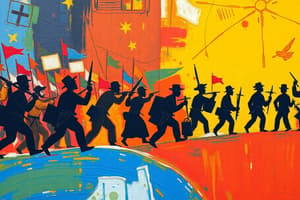Podcast
Questions and Answers
What term was used to describe psychological symptoms in soldiers during the Civil War?
What term was used to describe psychological symptoms in soldiers during the Civil War?
- Nervous Collapse
- Soldier's Heart (correct)
- War Trauma
- Battle Fatigue
Which of the following was a common reaction to combat stress during the Civil War?
Which of the following was a common reaction to combat stress during the Civil War?
- Increased confidence
- Emotional numbness (correct)
- Loss of appetite
- Aggressive behavior
How were mental health issues generally perceived during the Civil War era?
How were mental health issues generally perceived during the Civil War era?
- As a common soldier's complaint
- As a natural reaction to injuries
- As moral failings (correct)
- As a sign of bravery
What were the primary treatment options available for soldiers experiencing combat stress?
What were the primary treatment options available for soldiers experiencing combat stress?
What impact did the experiences of soldiers during the Civil War have on future mental health practices?
What impact did the experiences of soldiers during the Civil War have on future mental health practices?
Flashcards are hidden until you start studying
Study Notes
PTSD during the Civil War
Soldier's Heart
- Term used to describe psychological symptoms in soldiers during the Civil War.
- Symptoms included anxiety, depression, irritability, and physical ailments without clear medical causes.
- Recognized as a condition stemming from the trauma of battle, akin to modern-day PTSD.
- Soldiers' Heart was often misunderstood, leading to stigma and inadequate treatment.
Combat Stress
- Combat stress reactions were common, affecting soldiers' mental performance.
- Reactions included acute anxiety, nightmares, and emotional numbness.
- The intensity of battle, exposure to death, and the gruesome nature of warfare contributed to these reactions.
- Treatment options were limited and often focused on rest or simple remedies rather than psychotherapy.
Mental Health Understanding
- The Civil War era lacked a comprehensive understanding of mental health issues.
- Mental illness was often attributed to moral failings or physical health rather than recognized as a psychological condition.
- Some military leaders began to acknowledge the need for better treatment of mentally affected soldiers.
- Post-war, the experience of soldiers contributed to the evolution of mental health practices and awareness in the late 19th century.
Soldier's Heart
- "Soldier's Heart" refers to psychological symptoms exhibited by Civil War soldiers, similar to modern PTSD.
- Common symptoms included anxiety, depression, irritability, and unexplained physical ailments.
- The condition was recognized as a consequence of combat trauma but suffered from misinterpretation, leading to stigma and lack of effective treatment.
Combat Stress
- Combat stress reactions were prevalent, significantly impairing soldiers' mental functionality.
- Symptoms included acute anxiety, nightmares, and emotional numbness, directly linked to the violent and traumatic experiences of war.
- Factors such as the intensity of battle and frequent exposure to death exacerbated these stress reactions.
- Treatment methods during this period were restrictive, often limited to rest or basic remedies instead of comprehensive psychological care.
Mental Health Understanding
- The Civil War period lacked advanced knowledge about mental health, often attributing mental illness to moral weaknesses or physical ailments.
- There was a growing recognition among some military leaders of the necessity for improved treatment of mentally affected soldiers.
- Experiences of soldiers during and after the war spurred progress in mental health treatment and increased awareness in the late 19th century.
Studying That Suits You
Use AI to generate personalized quizzes and flashcards to suit your learning preferences.




